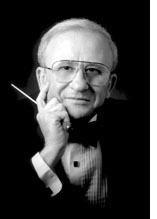|
By David Amos
 SAN DIEGO—How do composers conduct their own music? This is a question I am frequently asked, and has been the center of many a debate and discussion from the times composers faced orchestras from the 1600’s to our times. There is no answer that fits all situations, but here are a few thoughts which might put it in better perspective. SAN DIEGO—How do composers conduct their own music? This is a question I am frequently asked, and has been the center of many a debate and discussion from the times composers faced orchestras from the 1600’s to our times. There is no answer that fits all situations, but here are a few thoughts which might put it in better perspective.
The obvious starting point is to assume that no one could possibly understand a musical work better than its creator. True, but how about a composer who plays his own piano sonata, but who does not have the technique, the fingers to bring out what the printed page indicates? Here, there is very little argument, but it illustrates the importance of a conductor with true baton skills. A difficult work for the piano can come to life in the hands of a world class pianist, while the composer himself might give the music good spirit, but at the same time be inconsistent with phrases, rhythms, and note accuracy.
Here is another, possibly more intriguing example: The great American composer, Aaron Copland conducted in recordings many of his works with the London orchestras. These performances are available on CD today, and are certainly very fine expressions of the composer’s message. But, listen to Leonard Bernstein’s interpretations of the same works, and you will hear the difference!
While Copland was one of the outstanding musicians of our time, Bernstein, aside from his supreme gifts as a composer, lecturer, pianist, and author, was a master conductor who knew better than practically anyone else his way around the podium. He could penetrate an orchestral score to such depth, bring out the subtleties in the music, give it that special energy for which he was so well recognized, and emphasize the prominent instruments of the orchestra with such skill, that the differences were obvious and clear to everyone’s ear.
The two men were good friends, and frequently discussed the different ways in which Copland’s music should be played.
But, in turn, who could possibly conduct the music of Leonard Bernstein better than himself? You guessed it: Nobody. I was in Israel during the years 1980-85, with various conducting assignments, when Bernstein was performing and recording his own music with the Israel Philharmonic; time after time, musicians from the Philharmonic were raving to me and to anyone who listened to them about the marvelous music making which was taking place at Mann Auditorium when Bernstein was at the podium. He brought them to levels of inspiration which are legendary.
Go to the top of right column
|
|
But in so many other instances, composers are so wrapped up in the way the music should sound, that they lose their perspective when becoming a conductor of their own creations. Ernest Bloch recorded with the London Philharmonic his wonderful Sacred Service, Avodat Hakodesh. But his conducting is so straightforward, devoid of any inflections, subtleties, drama, or any attention to details, that it pales in comparison to other recorded versions.
So many composers are not the ideal interpreters of their own music. They can be oblivious to refined orchestral playing, shadings, and emotion which professional conductors with more objective eyes and ears can bring out. They may not have the right movements (baton technique) or the experience on how to talk to the musicians and demand what may be necessary to make the music sound better. I have heard appallingly poor performances of composers conducting their own music.
But it does not have to be that way. Bernstein was not the only great interpreter of his own works. Others, such as the late Morton Gould were very skilled conductors, who left us brilliant renditions of their own music and that of others.
Other composers, wisely, left it to others to interpret what they wrote. Julius Chajes, who composed many works of Jewish interest, once told me that “it is better to leave it in the hands of others; anyway, composers tend to conduct their own music too fast!”
When I was ready to conduct in recordings various works of Alan Hovhaness, the composer told me, “Here is the score; from this point, you are the interpreter. Do with it what you think is best”.
Others do not allow conductors this sort of complete freedom. I have sat down with composers in preparation of the recording of their music, where the clear message was “Follow exactly all the indications which I noted in the conductor’s orchestral score. Do not interpret anything that is not indicated, do not take different tempos, just conduct precisely what is there. The interpretation will take care of itself”. And in most cases, it did. Stravinsky was notorious for making these demands from others who conducted his music.
Yet, Stravinsky struggled in conducting his own works, especially later in life. Some of the best renditions we have on records are under his supervision, but conducted by his associate, Robert Craft.
What I have found very useful is to have the composer present during rehearsals and/or recording sessions. Although this opens the possibility of many other things to go wrong, my experiences with these cooperative efforts have been overwhelmingly favorable, where the final results were a good fusion of creator and interpreter.
Happy New Year, Shana Tova, and Tizku L’shanim Rabot!
|
|

